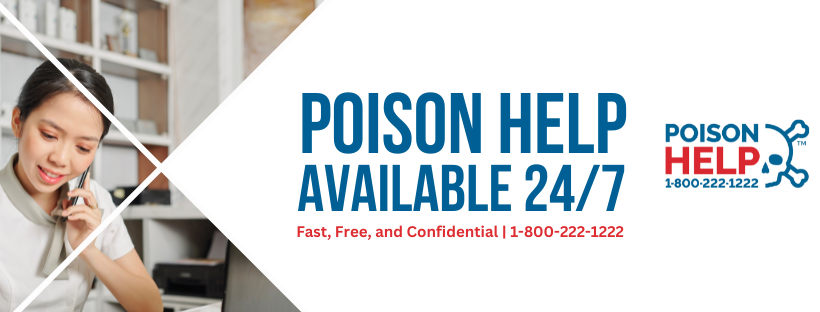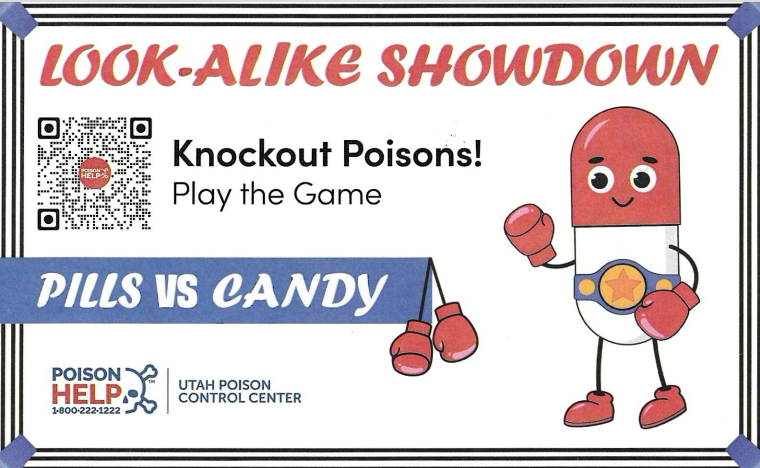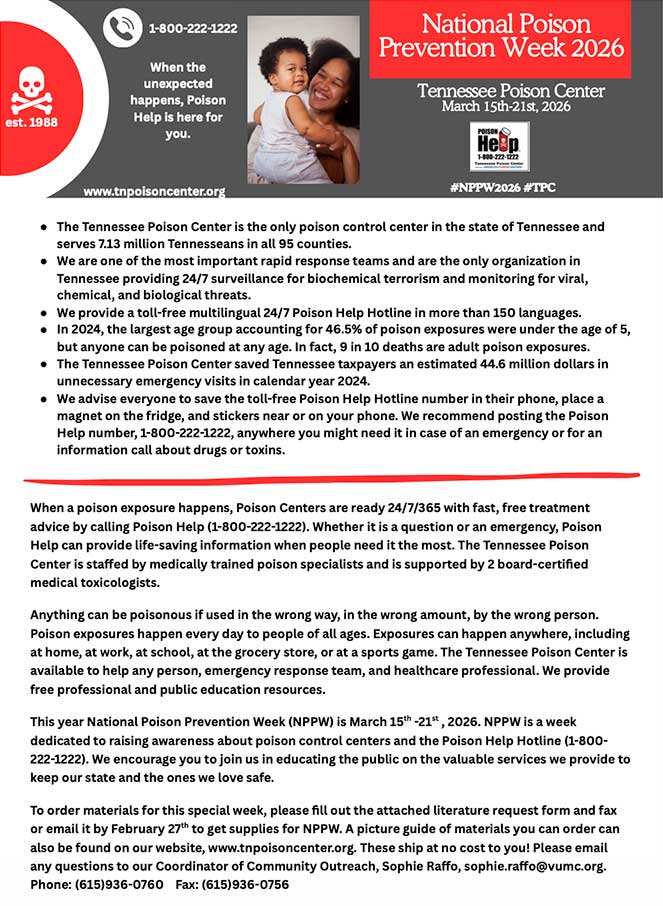
The Tennessee Poison Center provides poison prevention outreach to all 95 counties. This program provides information and education to the public, healthcare professionals, educators, industry managers and workers, the press, and individuals requesting information or assistance with identifying possible risks within the community resulting from exposure to poisons or hazardous materials.
The major goals of the outreach program are to:
- Develop community-based health and safety programs for all age groups
- Develop instructional materials for primary and secondary education
- Promote the Poison Help hotline service
- Provide community-based poison prevention and intervention programs
The poison center collaborates with the University of Tennessee Extension (UTEE) to provide poison prevention outreach to all Tennesseans. The UTEE present community-based programs and assists the poison center with extending the reach of poison prevention education. This collaboration with the UTEE won a prestigious Frist Foundation Award of Achievement in the Team Building category.
For more information regarding UTEE and their Be Poison Safe program, please visit their website.
SOCIAL MEDIA | @TNPOISONCENTER | #TNPoisonCenter
We are on Social Media!! Please go FOLLOW US and SHARE our content on Instagram @tnpoisoncenter and Facebook! Help spread the word!
We are happy to share anything related to public health, injury prevention, or community health events. If you or your organization would like to partner on your social campaign, we would be happy to spread the word! Just send over your content schedule with graphics & captions!
Play the Medicine vs. Candy game designed by Utah Poison Center! This is an engaging game that shows how closely medication can resemble candy, especially for young children. To play, scan the QR code with your phone!

-
POISON PREVENTION RESOURCES
The Tennessee Poison Center provides complimentary poison prevention resources, materials, and Poison Help swag for public and professional education. We fulfill, ship or hand deliver our poison prevention materials statewide, available to all Tennessean residents, schools, organizations, emergency response teams, and healthcare professionals. We also provide free curated education to focus on a specific topic to meet the accessibility and needs of our community.
INVENTORY UPDATES
Low-stock items with an * will no longer be available in a hard copy once inventory runs out. All resources will be available in a pdf which can be used to print or distribute digitally. We will be adding new resources, so make sure to check those out!*PDFs If you plan to print or send it, please check the box for pdf, and make a note for us! We would love to know how many you plan to distribute so we can add them to our resource-tracking database!
TN POISON CENTER LITERATURE REQUEST FORM
Please click here to see the literature picture guide of available materials
**FILL OUT THE FORM COMPLETELY AND SUBMIT VIA EMAIL OR FAX.BRAND CHANGES
AAPCC: America Association of Poison Control Centers is now known as APC: America’s Poison Centers.What does this mean? Everything has been rebranded with APC’s new look, logos, and colors.
The Poison Center Association, Poison Help, and NPDS logos are now red, blue, and white logos. Don’t fret the poison help number is 1-800-222-1222 and the information is still the same!**Please keep in mind some materials will have the new or old logo. That means the big red, black, and white logo that you’ve grown to know and love, may no longer be jumping out at you, depending on your orders! The Tennessee Poison Center is here to keep you and the state we love safe! Help spread the word!
-
NATIONAL POISON PREVENTION WEEK || MARCH 16-22, 2026
2026 NPPW THEME: WHEN THE UNEXPECTED HAPPENS, WE'RE HERE FOR YOU 24/7.
There will be lots of content, games, and educational opportunities to be used for safety education! Download the toolkit with teaching resources, and social content to share! There is a National Poison Prevention Week Student Poster and Video contest with prizes, look for the date it launches, please share to see if the children and teens in the community would like to participate!
THE 2026 NPPW DOWNLOAD
NPPW 2026 TN POISON CENTER FLYER
2026 PARTNER TOOLKIT DOWNLOAD + ADD THE TENNESSEE POISON CENTER LOGO
Please tag @tnpoisoncenter & #TNPoisonCenter in every post!

-
RESOURCE GUIDES
The resource guides are supported by the Health Resources and Services Administration (HRSA) of the U.S. Department of Health and Human Services (HHS) as part of an award totaling $436,191.00 with 0 percent financed with non-governmental sources. The contents are those of the author(s) and do not necessarily represent the official views of, nor an endorsement, by HRSA, HHS, or the U.S. Government.
Prevent a Poisoning || English || Spanish || Kurdish || Vietnamese
Poison Help Tri-Fold || English || Spanish
How Safe Is Your House? || English || Spanish
Keeping Babies and Preschoolers Safe from Addictive, Toxic Substances
Cyanide Exposure Risk and Management
Tennessee Poison Center & Terrorism
ENVENOMATIONS & OUTDOOR POISONS
SEASONAL
ACTIVITIES
SPIKE'S POISON ADVENTURE || MP3 || WMV || LESSON PLAN || PARENT BROCHURE || SPIKE'S EXPERIENCE CHART || SPIKE CONNECT THE DOTS
Digital || Poison Prevention Hero
Activity Book || English || Spanish
Hunter & Scout Activity Sheets
POSTERS
Additional poison prevention resources are available or for download from the American Association of Poison Control Centers' website: poisoncenters.org/
-
KEEPING CHILDREN SAFE
Young children are curious explorers. They like to climb and seem to get into everything! They also like to examine brightly colored pills and attractively packaged household products. And most children, if given a chance, will put some of these products into their mouths and swallow them.
Each year, thousands of children are poisoned accidentally. Many are injured from ingesting medicines, drain cleaners, bleaches, other household chemicals and even household plants.
Children should be taught the following safety messages in order to stay safe from poisons:
- Always ask a grown-up first before you eat or drink anything.
- Take medicine only from a grown-up that you trust.
- Tell a grown-up if you think you have eaten or drank a poison. Never wait to see if you get sick.
- Tell a grown-up if someone finds a poison.
Most poisonings occur when a product is in use. If you are using a household product when called to the telephone or door, take it with you.
Adults should save the hotline telephone number to their cell phones (1-800-222-1222) and keep the telephone number near their land line telephones.
Tennessee Poison Center has telephone stickers and refrigerator magnets available by calling the administrative office at 615-936-0760.
-
People over age 60 often ask why they should be concerned about poisons or when they should call a poison control center.
FAQs FOR 60+ ADULTS
Are people over age 60 more susceptible to poisons?
Adults that take multiple medications or have chronic diseases have a higher risk for illness after a poisoning and experience more serious problems than any other age group.
What poison situations are common in older adults?
- Medication mistakes
- Food poisoning
- Inhaling toxic fumes
How can adults reduce their risks of poisoning?
- Keep a list of all your prescription, over-the-counter and herbal medications in your wallet. Show this at every visit to a physician or pharmacy. Ask if all the medicines are necessary and if they are safe to take together. Make a note to report medications that may be causing new symptoms.
- Take steps to prevent problems if you are visited by grandchildren or persons with dementia. Store food and drug products away from cleaners and chemicals. Poisoning can occur when chemicals in plastic bottles are the same color as sports drinks. Put medications and non-food items in latched cabinets.
- Make sure your home fuel-burning heating system is checked each year. Carbon monoxide (CO) is a hazard to anyone, but especially to people with heart disease. CO is produced by fuel-burning appliances. Get your furnace checked each year for proper exhaust. Keep portable generators and charcoal grills in open areas outside your home and away from windows.
- Create a method for remembering when daily medicines are taken. Some elders use pill-minders to tell at a glance if timed doses were taken. Other seniors prefer placing a check mark on a calendar next to dosages taken. Create a system that works for you.
How does Tennessee Poison Center help older adults?
- Through the Poison Help hotline (1-800-222-1222). Nurses, pharmacists and physicians with poison management expertise give advice 24 hours a day, 7 days a week. Callers find relief in getting answers for their specific concern within minutes. It’s great to be reassured even if the poisoning was just a minor problem. Many seniors call about medication concerns when their pharmacist or physician can’t be reached.
- Through education. To request free poison prevention information, call Tennessee Poison Center at 1-800-222-1222 or visit the website at www.tnpoisoncenter.org
* Reprinted with information compiled by the Florida Poison Information Centers.
Why Should Older Adults Learn About Poisoning?
Everyone, from infants to older adults, is at risk for a poisoning exposure. Statistics show that 19.9 persons per 1,000 are victims of accidental poisoning.
What Are Some Poisoning Risks?
- Taking extra doses of medicine (prescription or over-the-counter)
- Taking a prescription medication at the wrong time or missing a dose of medication
- Combining medications
- Inhaling carbon monoxide fumes unknowingly from a leaky gas furnace or stove
- Mixing bleach and ammonia (or other cleaning agents), which creates a poisonous gas
How Can Older Adults Stay Safe From Poisons?
- Never mix cleaning products or chemicals.
- Read all labels before using any household product or medication.
- Keep products in their original containers with their original labels.
- Identify all flowers, bushes and trees in and around your home and find out which ones are poisonous.
Medicine Safety Tips
- Keep all medications in child-resistant containers and out of reach of children.
- Always turn on the light and put on glasses before taking or giving medicine.
- Take all medicines as prescribed, even if you begin to feel better.
- Never take someone else's medicine or share your medicine. The dose might be wrong, or you may be allergic to the medicine.
- Never mix medicines unless directed by your doctor. Some medicines can cause serious side effects when mixed together.
- Dispose of old medicines by flushing them down the toilet. Then rinse the container and throw away the empty container.
- A small number of medicines have specific instructions to immediately flush down the toilet when no longer needed. Click here to see if your medication is on the list.
Save the hotline phone number in your cell phone. If you suspect a poisoning, don't wait for symptoms to appear. Call Tennessee Poison Center at 1-800-222-1222. All calls are free and confidential.
-
HRSA has developed a Poison Help Campaign that features a website with downloadable resources to inform and educate the public on poison prevention; including the National Poison Help toll-free number (1-800-222-1222) that callers can use to reach a Poison Control Center. The Campaign also serves as a resource for health professionals, Poison Control Center staff, and injury prevention organizations.
Dr. Donna Seger, Executive Director of Tennessee Poison Center, discusses methamphetamine and children in the August 2006 issue of House Organ magazine, a publication of Vanderbilt University Medical Center.
Safe Kids Worldwide is a global network of organizations whose mission is to prevent accidental childhood injury, a leading killer of children 14 and under. The American Association of Poison Control Centers (AAPCC) collaborates with Safe Kids on poison prevention issues.
Progressive Agriculture Foundation provides resources and training for individuals and communities to conduct farm health and safety awareness and educational programs. The American Association of Poison Control Centers collaborates with Progressive Agriculture Foundation to teach poison prevention in rural communities.
Alliance for Consumer Education (ACE) is a national non-profit organization, that educates consumers on the proper use, storage, and disposal of household and institutional products. The American Association of Poison Control Centers partners with ACE and one of the programs supported by ACE is Inhalant Abuse and Prevention.
Tennessee Poison Center is a partner with the National Inhalant Prevention Coalition to reduce inhalant abuse in Tennessee. One in five students in America has used an inhalant to get high by the time he or she reaches the eighth grade. Parents might not know as much about the dangers of inhalant abuse as they do about the dangers of illegal drugs, tobacco and alcohol abuse. The National Inhalant Prevention Coalition website has information and resources in English and Spanish about the abuse of inhalants.
Poison Centers throughout the U.S. participate in National Poison Prevention Week, a time when communities can call attention to the dangers of accidental poisonings. National Poison Prevention Week is held annually the third week of March. Visit the link for additional information about National Poison Prevention Week and additional poison resources.
Utah Poison Control Center has an extensive poisonous plant database on their website (please note - some of these plants are not indigenous to Tennessee).
Tennessee Poison Center receives federal funds to help pay for poison control service in Tennessee. This grant is received from the Health Resources and Services Administration (HRSA), which operates a website dedicated to poison control information. Check out the press release about a new online tool to raise awareness of ways to prevent poisonings.
-
https://www.vumc.org/poison-control/hierbas-medicinales-y-medicinas-rec…
https://www.vumc.org/poison-control/hierbas-medicinales-y-medicinas-rec…
https://www.vumc.org/poison-control/forma-universal-de-medicina
https://www.vumc.org/poison-control/que-puedo-hacer-con-las-medicinas-v…
https://www.vumc.org/poison-control/que-puedo-hacer-con-las-medicinas-v…
https://www.vumc.org/poison-control/brown-recluse-reclusa-marron-black-…